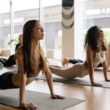Originating from India, Yoga is a way of life that combines physical and mental disciplines to achieve a peaceful body and mind. It helps to improve overall health and well-being. If you’re new to Yoga, you may feel overwhelmed by all the options available.
Yoga is an incredible form of exercise and mental well-being that can have numerous health benefits, especially for those just starting. Whether you’re a complete novice looking to try Yoga for the first time or someone with some experience who needs to brush up on their basics, this article will provide all the information you need to get started. So let’s begin!
Want to Dive into the World of Yoga but don’t know where to Start?
Yoga for beginners is a safe and fun way to explore new physical postures, breathing techniques, emotional connections, and spiritual perspectives. It’s an effective way to reduce stress, improve overall health and increase focus – all in one place!
With our beginner program, you can learn basic poses that will allow your body to gain flexibility while strengthening your muscles. And with our helpful guides, prepare for your first class without worrying if you are doing any poses correctly! You will soon become confident enough to try more challenging exercises at home or join group classes.
What is Yoga, and Why is it beneficial for beginners?
Yoga is a form of exercise that benefits your physical and mental health. The practice includes poses, meditation, breathing exercises, and relaxation techniques, which can help reduce stress levels while increasing strength and flexibility as well as overall well-being.
Yoga has become increasingly popular over the years and for a good reason. Not only is it a form of exercise, but it also promotes wellbeing and relaxation. For beginners, Yoga offers a gentle introduction to physical activity with movements that can be easily adapted to suit individual needs. It also encourages mindfulness and can help reduce stress levels.
It is beneficial for beginners by:
- Providing a safe and gentle introduction to physical activity.
- Improving flexibility, strength, and balance.
- Reducing stress levels.
- Helping to build self-confidence.
- Promoting relaxation and mindfulness.
Additionally, Yoga can improve not only physical flexibility and strength but also mental clarity and focus. Starting a yoga practice can be daunting, but with the right mindset and guidance, anyone can reap the benefits of this ancient practice. So why not try it and discover what it can do for you?
Different Types of Yoga and How Each Benefits Beginners?
Yoga is a wonderful way to improve flexibility, strength, and mental clarity. As a beginner, you may feel overwhelmed by the many different styles of Yoga out there. But fear not! Each style offers unique benefits that can help you achieve your goals.
Here are a few types of Yoga for beginners and their benefits:
Hatha yoga
Hatha Yoga is the perfect option for a beginner to learn the basics of Yoga. It is a slow-paced style, focusing on stretching and breathing techniques, which makes it an excellent way to transition from passive activities into a movement practice.
Hatha yoga helps strengthen muscles, reduce stress levels, improve posture, and increase flexibility.
Vinyasa Yoga
Vinyasa Yoga is a dynamic practice that connects postures with breath. It’s an excellent choice for those looking to increase their cardiovascular endurance and strength while gaining flexibility.
Vinyasa yoga can help improve physical and mental stamina, reduce stress levels, and allow practitioners to explore more challenging poses.
Restorative Yoga
Restorative Yoga is a gentle practice designed to reduce stress, improve relaxation, and promote healing. It is a great choice for developing a deep connection between the body and mind.
Restorative Yoga can help reduce pain, improve mental clarity, increase flexibility, and release muscle tension.
Iyengar Yoga
is a precision-based style that uses props such as blocks, straps, and bolsters to help practitioners reach an optimal alignment. This style of Yoga can be beneficial for those looking to gain strength and flexibility while increasing self-awareness.
Iyengar Yoga can improve posture, reduce stress levels, promote body awareness and relaxation, increase balance, and improve bone health.
With these different types of Yoga in mind, it’s easy to find one that suits your needs and preferences. No matter your style, you will undoubtedly reap the rewards of a regular yoga practice.
Getting Started with Yoga for Beginners
Now that you’re familiar with the different styles of Yoga, it’s time to start your practice! Remember: take things slowly, and don’t rush yourself.
Here are the Important Steps to Get You Started:
1. Find the right yoga class for you.
The right class for you suits your interests and experience level. Look for classes with experienced instructors who can provide guidance and support as you learn the poses.
2. Gather the necessary equipment, such as a yoga mat and comfortable clothing.
Equipements and clothing should help you move comfortably through poses. For example, choose non-slip yoga mats and clothes that allow unrestricted movement.
3. Warm up before practicing by doing light stretches or simple poses.
This will help you prepare your body for more intense poses.
4. Start with basic poses and gradually work your way up to more challenging ones.
By doing so, you can build your strength and practice poses safely.
5. Focus on your breath and use it to connect with the poses you are doing.
Paying attention to how you breathe can help reduce stress and improve concentration.
6. Don’t be afraid to ask questions and take breaks if needed.
Always practice with comfort and safety in mind. Some important questions include modifications for the poses and how to prevent injury.
7. Listen to your body and modify or do fewer reps if needed.
Yoga is a practice that should be tailored to your individual needs. Respect your body and its limitations.
8. Have Fun!
Enjoy the physical and mental benefits of Yoga and have Fun while practicing.
By following these steps, you can start your yoga journey with ease! With diligent practice, patience, guidance from experienced instructors, and, most importantly, self-love and understanding – you will soon become confident enough to try more challenging exercises at home or join group classes.
Questions to ask Yourself while starting with Yoga
Starting with Yoga can be an exciting journey of self-discovery. As with any new practice, it’s important to ask yourself a few questions to ensure that you’re setting yourself up for success.
- First, ask yourself what your goals are. Are you looking to increase your flexibility, reduce stress, or try something new?
- Next, consider your physical limitations. Are there any chronic conditions or injuries that you need to be mindful of during your practice?
- It’s also important to consider your schedule and how often you can commit to practicing Yoga.
- And finally, ask yourself what kind of support you might need, whether that’s a supportive community or a knowledgeable teacher.
By taking the time to consider these questions, you can set yourself up for a fulfilling and successful yoga journey.
Common struggles: Beginners face
Beginning any new practice can be challenging, and Yoga is no exception. In the beginning stages of your yoga journey, you may feel lost or overwhelmed in classes or have difficulty understanding some concepts. This is completely normal!
Here are some common struggles beginners face and how to overcome them:
1. Feeling intimidated by more experienced practitioners.
It’s completely normal to feel intimidated by more experienced practitioners in class. The best way to deal with this is to focus on your practice and not compare yourself to others.
2. Difficulty understanding the poses and instructions.
If you’re having trouble following along, try taking a beginner’s class or ask for help from your teacher. They can provide modifications and explain the poses in more detail to help you understand better.
3. Difficulty staying consistent with the practice
Set realistic goals and create a routine that fits into your lifestyle. This will make it easier for you to stick with it and stay consistent over time.
4. Feeling discouraged when you feel like you’re not making progress.
Remember that Yoga is a practice, and it takes time to build strength and flexibility. Be patient with yourself, and don’t get discouraged if your progress isn’t as quick as you hoped.
Starting a regular yoga practice can be an incredibly rewarding experience. You can reap Yoga’s many physical and mental benefits with patience, dedication, and guidance.
Frequently Asked Questions About Yoga for Beginners
Q: What type of Yoga is best for beginners?
A: Hatha Yoga and Vinyasa Yoga are both great options for beginners. Both styles focus on linking movement with breath, improving strength and flexibility, and reducing stress.
Q: Is it OK to practice Yoga at home?
A: Yes! It is perfectly fine to practice Yoga at home. Many instructors provide online classes and tutorials that can help guide your practice.
Q: What should I keep in mind when starting Yoga?
A: When starting Yoga, being mindful of your body and any limitations is important.
Q: Who is not recommended to practice Yoga?
A: Pregnant women, those with serious medical issues such as heart disease or high blood pressure, and any individuals with unstable or untreated injuries should consult their doctor before starting a yoga practice.
In Conclusion
Starting your yoga journey can be daunting and overwhelming, but with these helpful tips to guide you, hopefully, you feel more prepared. Remember that there is no perfect form for Yoga; it is an individual practice. Find classes or practices that work for you and enjoy the journey of discovering the physical, mental, and spiritual benefits of Yoga. Connecting to your breath during practice can help bring clarity to your thoughts while pushing your body beyond what you previously thought was possible.
Ultimately, don’t forget to have fun while you learn how to use this powerful form of exercise as an invaluable tool for self-care. It’s amazing where the yoga journey will take you if given a chance!









